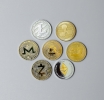Top 6 Methods for Verifying Stablecoins: A Comprehensive Guide

Top 6 Methods for Verifying Stablecoins: A Comprehensive Guide
Stablecoins are an innovative financial instrument that bridges the volatile cryptocurrency markets with the predictable world of traditional fiat currencies. By definition, stablecoins are cryptocurrencies designed to minimize the volatility typically associated with digital assets. Their value is pegged to a more stable asset, such as a fiat currency like the US dollar or a commodity like gold. The significance of stablecoins cannot be overstated—they offer a sanctuary of stability in the tumultuous crypto seas and have become vital for traders who wish to avoid market volatility without exiting the crypto space entirely.

Top 6 Methods for Verifying Stablecoins: A Comprehensive Guide
Top 6 Methods for Verifying Stablecoins: Ensuring Trust and Stability in the Crypto Market
1. Collateralization Audits
Collateralization is fundamentally what anchors stablecoins to their pegged value. A collateralized stablecoin is backed by an equivalent reserve of assets, whether it’s fiat, precious metals, or even other cryptocurrencies. The key here is that there should always be enough reserve assets to exchange all circulating stablecoin units if required. To ensure these reserves exist and are maintained correctly, third-party audits are essential.
During collateralization audits, independent auditors assess whether a stablecoin’s issuer actually holds the claimed reserves. This process might include verifying bank balances for fiat-backed coins or analyzing on-chain data for crypto-collateralized ones.
Collateralization is fundamentally what anchors stablecoins to their pegged value. A collateralized stablecoin is backed by an equivalent reserve of assets, whether it’s fiat, precious metals, or even other cryptocurrencies. The key here is that there should always be enough reserve assets to exchange all circulating stablecoin units if required. To ensure these reserves exist and are maintained correctly, third-party audits are essential.
During collateralization audits, independent auditors assess whether a stablecoin’s issuer actually holds the claimed reserves. This process might include verifying bank balances for fiat-backed coins or analyzing on-chain data for crypto-collateralized ones.
2. Smart Contract Security Checks
For many stablecoins—especially those running on programmable blockchains like Ethereum—smart contracts automate crucial operations such as issuance and redemption processes. These pieces of code must be watertight; any vulnerability can lead to significant financial loss or manipulation of coin supply.
Security checks conducted by experts involve meticulously reviewing and testing smart contract code against known vulnerabilities and potential exploits—often through both automated scanning tools and manual inspection by skilled developers.
For many stablecoins—especially those running on programmable blockchains like Ethereum—smart contracts automate crucial operations such as issuance and redemption processes. These pieces of code must be watertight; any vulnerability can lead to significant financial loss or manipulation of coin supply.
Security checks conducted by experts involve meticulously reviewing and testing smart contract code against known vulnerabilities and potential exploits—often through both automated scanning tools and manual inspection by skilled developers.
3. Transparency and Reporting Standards
Trust in any financial system relies heavily on transparency from issuers regarding how they operate and manage funds. For organizations issuing stablecoins, this means regularly publishing proof-of-reserves reports, undergoing external audits that verify claims about backing assets, sharing information about governance processes related to token issuance or changes in policy.
Adherence to high-quality reporting standards provides stakeholders with verifiable evidence about a coin’s health status—a critical factor when verifying integrity in an often opaque market environment.
4.Regulatory Compliance Verification
The world of cryptocurrencies often involves navigating complex legal landscapes and adhering strictly to regulatory requirements established by financial authorities globally—failure could mean fines or shutdowns for non-compliant entities.
Verification here entails examining whether issuers follow strict Anti-Money Laundering (AML) guidelines, Know Your Customer (KYC) protocols among others set forth by regulators across jurisdictions where they operate—a critical step toward legitimizing their operations within traditional financial systems’ frameworks.
5.Community Trust and Reputation Analysis
Finally yet importantly rests community trust; it’s not something easily quantifiable but incredibly significant nonetheless — trust ultimately underpins user willingness engage with particular currency over another one available options out there today’s crowded marketplace.
Methods for evaluating trust include assessing user feedback across social platforms forums dedicated spaces (like Reddit), tracking overall market acceptance via trade volumes presence exchanges worldwide analyzing expert reviews from industry commentators leaders alike—all which paint picture general sentiment surrounding specific offering thereby informing public opinion potentially affecting uptake usage rates accordingly.
In conclusion while perfect guarantees don’t exist within realm finances especially newer technologies like blockchain proper verification mechanisms place ranging tangible collateral audits comprehensive smart contract security review protocols intangible reputation analysis can collectively provide robust foundation upon which users can build reasonable expectations around safety resilience offered various offerings today ever-evolving ecosystem digital currencies…
Stablecoins, Cryptocurrency, Verification Methods, Financial Security, Blockchain Technology
Trust in any financial system relies heavily on transparency from issuers regarding how they operate and manage funds. For organizations issuing stablecoins, this means regularly publishing proof-of-reserves reports, undergoing external audits that verify claims about backing assets, sharing information about governance processes related to token issuance or changes in policy.
Adherence to high-quality reporting standards provides stakeholders with verifiable evidence about a coin’s health status—a critical factor when verifying integrity in an often opaque market environment.
4.Regulatory Compliance Verification
The world of cryptocurrencies often involves navigating complex legal landscapes and adhering strictly to regulatory requirements established by financial authorities globally—failure could mean fines or shutdowns for non-compliant entities.
Verification here entails examining whether issuers follow strict Anti-Money Laundering (AML) guidelines, Know Your Customer (KYC) protocols among others set forth by regulators across jurisdictions where they operate—a critical step toward legitimizing their operations within traditional financial systems’ frameworks.
5.Community Trust and Reputation Analysis
Finally yet importantly rests community trust; it’s not something easily quantifiable but incredibly significant nonetheless — trust ultimately underpins user willingness engage with particular currency over another one available options out there today’s crowded marketplace.
Methods for evaluating trust include assessing user feedback across social platforms forums dedicated spaces (like Reddit), tracking overall market acceptance via trade volumes presence exchanges worldwide analyzing expert reviews from industry commentators leaders alike—all which paint picture general sentiment surrounding specific offering thereby informing public opinion potentially affecting uptake usage rates accordingly.
In conclusion while perfect guarantees don’t exist within realm finances especially newer technologies like blockchain proper verification mechanisms place ranging tangible collateral audits comprehensive smart contract security review protocols intangible reputation analysis can collectively provide robust foundation upon which users can build reasonable expectations around safety resilience offered various offerings today ever-evolving ecosystem digital currencies…
Stablecoins, Cryptocurrency, Verification Methods, Financial Security, Blockchain Technology














Report
My comments